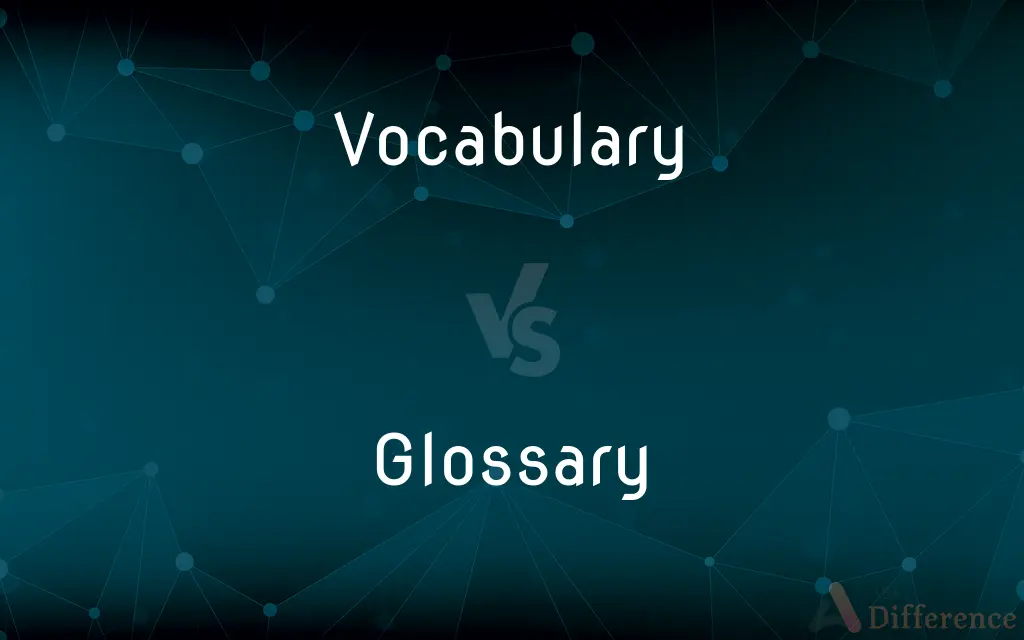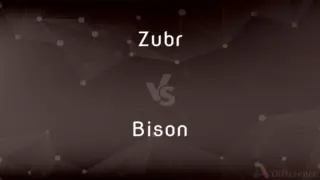Vocabulary vs. Glossary — What's the Difference?
By Fiza Rafique & Maham Liaqat — Updated on March 8, 2024
Vocabulary encompasses all the words known and used by a person, while a glossary is a list of terms with definitions, often found in books.

Difference Between Vocabulary and Glossary
Table of Contents
ADVERTISEMENT
Key Differences
Vocabulary refers to the collection of words that an individual knows and uses in communication. This includes words for speaking, reading, and understanding a language. Whereas a glossary is a specialized list of terms and their definitions typically found at the end of a book, article, or in a specific field of study, aimed at clarifying meanings and aiding understanding.
Vocabulary development is a continuous process that evolves with learning and exposure to new words and contexts. On the other hand, a glossary is a static compilation related to a specific text or subject area, designed to be a reference tool for clarification purposes.
The breadth and depth of one's vocabulary can significantly influence their ability to express thoughts and understand others. Whereas a glossary serves more as a support tool, enhancing the comprehension of specialized or unfamiliar terms within a specific context.
Vocabulary is a general term applicable across languages and contexts, reflecting the linguistic capabilities of an individual or group. In contrast, glossaries are specific to particular texts or disciplines, providing targeted assistance in understanding specialized language.
Vocabulary acquisition involves multiple strategies, including reading, conversation, and educational activities. Meanwhile, glossaries are created by authors or experts to accompany specific texts or cover particular subjects, facilitating a deeper understanding of the content.
ADVERTISEMENT
Comparison Chart
Definition
Collection of words known and used by an individual.
List of terms with definitions, typically found in books or specific fields.
Purpose
Facilitates communication and understanding in various contexts.
Clarifies meanings of specialized or unfamiliar terms in a specific context.
Development
Evolves with learning, exposure, and experience.
Compiled for a specific text or subject area, generally static.
Application
General, across languages and contexts.
Specific to texts, disciplines, or subject areas.
Acquisition
Through reading, conversation, and education.
Created by authors or experts to accompany specific content.
Compare with Definitions
Vocabulary
Grows with exposure to new contexts and information.
Traveling and reading widely are excellent ways to broaden your vocabulary.
Glossary
Helps readers understand specific or technical terms.
Students often refer to the glossary when encountering unfamiliar words.
Vocabulary
Enables expression and comprehension in conversations and writings.
A diverse vocabulary allows for more precise and nuanced communication.
Glossary
A compilation of specialized terms with definitions.
The glossary at the book's end clarifies technical jargon.
Vocabulary
The entirety of words a person knows and utilizes.
Expanding your vocabulary can enhance your communication skills.
Glossary
Tailored to a particular field or text.
The medical glossary included terms like hypertension and arrhythmia.
Vocabulary
Reflects an individual's linguistic competence.
A rich vocabulary is often indicative of high language proficiency.
Glossary
Supports learning by defining key concepts.
The science textbook featured a glossary with essential terms for each chapter.
Vocabulary
Integral to cognitive development and educational success.
Children's vocabulary size is a key predictor of their reading comprehension and academic achievement.
Glossary
Remains unchanged unless updated by the author or publisher.
The glossary didn't include the newly coined terms, as it hadn't been updated recently.
Vocabulary
A vocabulary is a set of familiar words within a person's language. A vocabulary, usually developed with age, serves as a useful and fundamental tool for communication and acquiring knowledge.
Glossary
A glossary (from Ancient Greek: γλῶσσα / language, speech, wording) also known as a vocabulary or clavis, is an alphabetical list of terms in a particular domain of knowledge with the definitions for those terms. Traditionally, a glossary appears at the end of a book and includes terms within that book that are either newly introduced, uncommon, or specialized.
Vocabulary
All the words of a language.
Glossary
An alphabetical list of words relating to a specific subject, text, or dialect, with explanations; a brief dictionary
A glossary of Inuktitut words
Vocabulary
The sum of words used by, understood by, or at the command of a particular person or group.
Glossary
A list of often difficult or specialized words with their definitions, often placed at the back of a book.
Vocabulary
A list of words and often phrases, usually arranged alphabetically and defined or translated; a lexicon or glossary.
Glossary
A list of terms in a particular domain of knowledge with their definitions.
At the back of the book you can find the glossary.
Vocabulary
A supply of expressive means; a repertoire of communication
A dancer's vocabulary of movement.
Glossary
A collection of glosses or explanations of words and passages of a work or author; a partial dictionary of a work, an author, a dialect, art, or science, explaining archaic, technical, or other uncommon words.
Vocabulary
A usually alphabetized and explained collection of words e.g. of a particular field, or prepared for a specific purpose, often for learning.
Glossary
An alphabetical list of technical terms in some specialized field of knowledge; usually published as an appendix to a text on that field
Vocabulary
The collection of words a person knows and uses.
My Russian vocabulary is very limited.
Vocabulary
The stock of words used in a particular field.
The vocabulary of social sciences is often incomprehensible to ordinary people.
Vocabulary
The words of a language collectively; lexis.
The vocabulary of any language is influenced by contacts with other cultures.
Vocabulary
(by extension) A range of artistic or stylistic forms or techniques.
Vocabulary
A list or collection of words arranged in alphabetical order and explained; a dictionary or lexicon, either of a whole language, a single work or author, a branch of science, or the like; a word-book.
Vocabulary
A listing of the words used in some enterprise
Vocabulary
A language user's knowledge of words
Vocabulary
The system of techniques or symbols serving as a means of expression (as in arts or crafts);
He introduced a wide vocabulary of techniques
Common Curiosities
What is the purpose of a glossary in a book?
A glossary helps clarify specific or technical terms, aiding reader comprehension.
What is vocabulary?
Vocabulary is the set of words known and used by a person in speech and writing.
What is a glossary?
A glossary is a list of terms with their definitions, usually found in books or related to specific fields.
Are glossaries found in all books?
No, glossaries are typically found in textbooks, technical books, or works with specialized terminology.
Why is vocabulary important?
A rich vocabulary enhances communication, expression, and comprehension abilities.
How does vocabulary differ from a glossary?
Vocabulary refers to all words a person knows, while a glossary is a specific list of terms with definitions for clarification purposes.
Does everyone have the same vocabulary size?
No, vocabulary size varies widely among individuals, influenced by factors like education, reading habits, and language exposure.
Is vocabulary static or dynamic?
Vocabulary is dynamic, constantly evolving with new experiences and learned information.
Can a glossary include slang or colloquial terms?
Yes, if these terms are relevant to the text or subject, they may be included in a glossary.
Can vocabulary size affect learning?
Yes, a larger vocabulary is associated with better reading comprehension and academic success.
How are glossaries created?
Glossaries are compiled by authors or experts to define terms specific to the text or subject matter.
How can one expand their vocabulary?
Reading, engaging in diverse conversations, and educational activities can help expand vocabulary.
Can vocabulary growth impact cognitive development?
Yes, vocabulary acquisition is closely linked to cognitive development, especially in children.
How does a glossary aid in specialized fields?
In specialized fields, a glossary can clarify technical terms, making complex information more accessible.
What role does vocabulary play in language proficiency?
A broad vocabulary is crucial for high language proficiency, enabling better expression and understanding.
Share Your Discovery

Previous Comparison
Affluent vs. Rich
Next Comparison
Zubr vs. BisonAuthor Spotlight
Written by
Fiza RafiqueFiza Rafique is a skilled content writer at AskDifference.com, where she meticulously refines and enhances written pieces. Drawing from her vast editorial expertise, Fiza ensures clarity, accuracy, and precision in every article. Passionate about language, she continually seeks to elevate the quality of content for readers worldwide.
Co-written by
Maham Liaqat













































